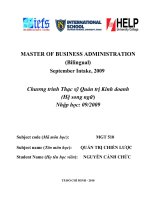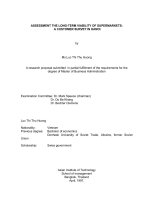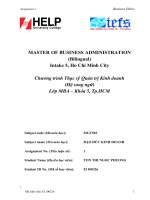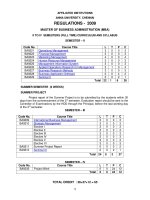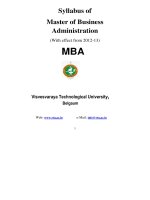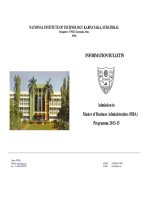MASTER OF BUSINESS ADMINISTRATION (MBA) pdf
Bạn đang xem bản rút gọn của tài liệu. Xem và tải ngay bản đầy đủ của tài liệu tại đây (148.29 KB, 18 trang )
MASTER OF BUSINESS ADMINISTRATION (MBA)
INTRODUCTION
The Master of Business Administration (MBA) Programme is developed to meet the needs
for employment and professional advancement in the dynamic and rapidly growing sector
of business and industry. The curricula provide students with advance courses that have
been designed in consultation with leaders in business and industry. These courses reflect
the most recent international development in management and industrial good practices
including technology.
The courses are geared towards preparing the students to be
responsive and competent professionals. They will have the ability to manage and analyze
various aspects of management, industrial administration and also understand
environmental factors to ensure strategic development. Furthermore, they will be able to
determine and identify ways to improve performance of the organization in a complex and
competitive world.
Objectives
The main objectives of the programme are:
1.
Training of high profile individuals for management of state-owned as well as
private entities/institutions.
2.
Combining administrative and financial applications in theory and practice to help
graduates put their best foot forward in a complex work environment.
3.
Providing in-depth knowledge in the most recent financial and administrative
innovations in order to upgrade skills in human and material resources.
Clientele
The programme will cater for professionals in job situations and also those who wish to
upgrade and improve their competence in teaching skills. It will also create avenues for
young graduates who would want to make business administration a career option.
1st Semester
Organization of the Programme
The MBA programme is organized into five specialization slants; viz:
Finance, Marketing, Human Resource Management, Tax Administration or Project
Management (18 months duration). There is also an MBA for Senior Executives (24
Months by part time).
The MBA for Executive caters for highly placed Executives (Senior Managers, Managing
Directors, etc), who would not have the luxury of time to study full-time; but can spare the
evenings and weekends to attend face-to face contact with their tutors.
Assessment Procedure
All students must undergo a 10 week internship and start dissertation work proper during
the long vacation between the 2nd and 3rd semesters.
An internship report will be graded as part of the continuous assessment. The examination
process will comprise of continuous assessment and written exams for each course. The
following weighting will apply:
- Written exams
-
60%
- Continuous Assessment
-
25%
- Project
-
10%
- Internship Report
-
5%
2
1st Semester
No
Course
Core/Elective
Description
Credit
Code
Hrs.
1
MBA 641
Core
Accounting for Managers
3
2
MBA 642
Core
Economic Analysis I
3
3
MBA 643
Core
The Management Process
3
4
MBA 644
Core
Marketing Management
3
5
MBA 645
Core
Quantitative Methods for Business
3
6
MBA 646
Elective
Capital Markets & Institutions
3
7
MBA 647
Elective
Advertising & Consumer Behaviour
3
8
MBA 618
Elective
Human Resource Management
3
9
MPA 616
Elective
Tax Legislation and General Principles in Sierra
3
Leone
10
MBA 619
Elective
Introduction to project management and systems
3
11
MBA 629
Elective
Contract and Procurement Management
3
Total Credit Hours/Student
18
Total Credit Hours/Student in Project Management
21
2nd Semester
No
Course
Core/
Code
Description
Elective
Credit
Hrs.
1
MBA 650
Core
Behavioural Science
3
2
MBA 652
Core
Economic analysis II
3
3
MBA 653
Core
Financial Management
3
4
MBA 654
Core
Business Law
3
5
MBA 655
Core
Statistical Analysis & Computer Applications
3
6
MBA 626
Elective
Corporate Financial Policy
3
7
MBA 627
Elective
Marketing Research
3
8
MBA 628
Elective
Industrial and Labour Relations
3
9
MPA 625
Elective
Accounting, Auditing and Tax Application in Sierra
3
Leone
10
MBA 639
Elective
Project Risk Management
3
Total Credit Hours/Student
18
3
1st Semester
3rd Semester
No
Course
Core/Elective
Description
Code
Credit
Hrs.
1
MBA 659
Core
Business Research Methods
3
2
MBA 661
Core
Advanced Personnel Administration
3
3
MBA 662
Core
Business Policy and Strategy
3
4
MBA 663
Core
Entrepreneurial Development
3
5
MBA 664
Core
Advanced Computer Applications
3
6
MBA 635
Elective
Investment Management & Portfolio Theory
3
7
MBA 636
Elective
Sales Management
3
8
MBA 637
Elective
Organization and Development
3
9
MPA 663
Elective
Tax Administration and Compliance in Sierra
3
Leone
10
MBA 649
Elective
Integrated Planning and Scheduling
Total Credit Hours/Student
3
18
Entry Requirements
M. B. A. (Executive)
- All applicants must posses a bachelors degree in any field of study from a recognized
University.
- Must be in employment and not below the level of manager in the organization and must
have had at least three years working experience.
M. B. A. (Administration, Project Management or Finance)
A good first degree from a recognized University.
Course Structure
The M. B. A. Programme will be completed in 18 months commencing with the beginning
of each academic year. An academic Dissertation in a topical issue related to business will
4
1st Semester
form part of the MBA Programme. The dissertation should be of a length of between
10,000 and 15,000 words.
Electives
Course
Credits
Finance Option
MBA 616
1. Capital Markets & Institutions
3
MBA 626
2. Corporate Financial Policy
3
MBA 635
3. Investment Management & Portfolio theory 3
Marketing Option
Course
MBA 617
1. Advertising & Consumer Behaviour
3
MBA 627
2. Marketing Research
3
MBA 636
3. Sales Management
3
Human Resources Option
Credits
Course
Credits
MBA 618
1. Advanced Personnel Administration
3
MBA 628
2. Industrial & Labour Relations
3
MBA 637
3. Organization and development
3
Project Management Option
MBA 619
1. Intro to Project Management & Systems
3
MBA 629
2. Project Risk Management
3
MBA 639
3. Contract and Procurement Management
3
MBA 649
4. Integrated Planning and Scheduling
3
Taxation Option
MPA 616
Tax Legislations and General Principles in Sierra Leone
MPA 625
Accounting, Auditing and Tax Application in Sierra Leone
MPA 636
Tax Administration and Compliance in Sierra Leone
Course Grading
Course work as well as the project will be graded in accordance with the following:
Percentage Equivalent
Alphabetical Grading
5
1st Semester
75+
A
65 – 74
B
50 – 64
C
40 – 49
D
30 – 39
E
0 - 29
F
Award of the MBA Degree
The MBA shall be awarded to candidates who obtain a minimum of pass (i.e. C) in every
course including the project leading to the accumulation of 60 credit hours.
OUTLINE OF COURSES
1st Semester
MBA 641 - Accounting for Managers
An accounting course designed to introduce the student to basic accounting concepts,
practices and procedures. Emphasis is on the techniques and theories of recording and
reporting of financial data to external users of accounting information collection,
summarization and reporting of data in accordance with generally accepted accounting
principles. The course would provide an opportunity for examining fundamental problems
in accounting and the reconciliation of theory with practice.
MBA 642 - Economic Analysis I
The main purpose of this course is to quickly introduce the student to Economic Analysis
incorporating micro and macro economic analysis. Since the intention is to familiarize the
student with the subject, the focus will be on preparing the student to appreciate the
relevance of economic analysis in management. Topics to be covered will include, among
others, decision making within the firm, behaviour of individual firms reacting to supply
and demand forces, the consequences alternative market structures, value and distribution,
partial and general welfare equilibrium, national income and prices, monetary system,
fiscal and monetary policies, etc. This course deals with business decision-making within
the firm, and business policies. Topics to be covered will include supply and demand
analysis; value and distribution; partial and general welfare equilibrium.
MPA 615 - Process of Management
6
1st Semester
The purpose of this course is to enable students understand the process of management in
complex organizations. The approach will be both historical and comparative drawing
heavily on empirical evidence and experience. The major focus will be the Sierra Leone
work organizations with evidence provided by other contexts as points of departure. The
course will among others address the following issues: the evolution of management in
both theory and practice; the role and nature of management in different socio-economic
systems; the functions of management; human factors in management; approaches to the
measurement and control of organizational performance; organizational efficiency and
effectiveness; the handling of delegation and time in organization and management
development; organization design problems of management in the under-developed as well
as developed countries and emergent perspectives and practices.
MBA 619 – Introduction to Project Management and Systems
With an emphasis on planning, this course introduces project management fundamentals
and principles from the standpoint of the manager, who must organize, plan, implement
and control non-routine activities to achieve schedule, budget and performance objectives.
Topics include project life cycles, organization and charters; work breakdown structures;
responsibility matrixes; as well as planning, budgeting and scheduling systems. Planning
and control methods such as PERT/CPM, Gantt charts, earned value systems, project
management software applications and project audits are introduced
MBA 629 – Contract and Procurement Management
This course examines processes through which goods and services are acquired in the
project management environment. Topics include contract and procurement strategies;
legal issues; contract pricing alternatives; technical, management and commercial
requirements; RFP development; source selection; invitations to bid; bid evaluation; risk
assessment; and contract negotiation and administration.
MBA 644 - Marketing Management
The course is intended to equip the student with the wherewithal for the formulation and
effective implementation of marketing programmes in the context of flux-filled and
opportunity-generating environment.
It will adopt the managerial approach, relying
heavily on the use of case studies. In the analysis of cases, the student assumes the role of
a top marketing executive engaged in marketing planning, decision-making and problem
7
1st Semester
solving. The course begins with a study of the underlying forces, which shape marketing
decisions such as the marketing system, demand, consumer motivation and behaviour, and
the economic, legal, political and socio-cultural contents within which all marketing
decisions must be made.
Considerable attention will be devoted to the analysis of the components of a good
marketing strategy (target-market selection, product, price, promotion, and distribution
decisions) and the integration of these elements into an internally and externally consistent
whole. Other topics to be covered will include marketing intelligence and social and
ethical issues in marketing as they relate to marketing plan formulation and
implementation.
MBA 645 - Quantitative Methods for Business
The purpose of this course is to develop basic competence and judgment in using
quantitative techniques to solve and analyze decision making problems in business fields.
The course will consist of:
1.
Elementary set theory; functions; inequalities; graphs and elementary matrix
Operations.
2.
Concept of Optimization: will include the formulation of mathematical models,
basic notion of differential and integral calculus with business applications, and
general treatment of applications of linear programming techniques.
3.
Statistical Analysis:
will include basic notion of probability, descriptive data
analysis, statistical inference and simple regression analysis. Emphasis will be
placed on problem structure and formulation, while, when possible, standard
computer programmes will be used in obtaining solutions.
MBA 646 - Capital Markets & Institutions
A survey of the structure and operation of the market for medium and long-term securities.
The course will examine the nature, types, sources and uses of securities as well as the
nature, objectives, structure, functions and practices of institutions such as the stock
exchange, acceptance houses, trusts, investment banks, insurance companies, and
international finance institutions.
Economic and legal aspects of the capital market,
analysis of interest rates, cost of capital, prices of securities, risks dividend policies and
their implications for investment decision and income will also be studied.
8
1st Semester
MBA 647 - Advertising & Consumer Behaviour
This course is intended to enable the student understand the basis and nature of consumer
Purchasing and consumption behaviour, the formulation and implementation of effective
advertising programmes and thus prepare him for better marketing decision-making. The
course is inter-disciplinary, relying heavily on concept and theories borrowed and adapted
from other behavioural sciences especially psychology, social psychology, sociology,
economics and anthropology.
Topics to be covered will include the role of Advertising in the marketing mix, advertising
and the process of communication, influence of buyer behaviour on the character of
promotional efforts, determining basic promotional strategy; choice of appropriate methods
to achieve desired objectives; planning creative strategy
MBA 618 - Human Resource Management
The most valuable and most dynamic of all resources are the topics to be discussed in this
course.
The students would be required to understand the principles and processes
involved in the procurement, utilization, and compensation of human resources. Topics to
be covered will include modern organization theories, forecasting and planning of human
resources, its relevance of productivity and the concepts of its measurement, recruitment,
selection including tests and interviews, job analysis and evaluation, performance appraisal,
leadership and satisfaction theories and practice, wages-theories and administration, trade
unionism in Sierra Leone and in the international context, collective bargaining, factory
administration, etc.
MPA 616 - Tax Legislation and General Principles in Sierra Leone
Introduction to the Sierra Leone Tax Law
- Principles of Taxation, Periods and Types of Assessment, Other Relevant
Regulations;
- Sources of Tax Law and Regulations.
Types of taxes and their bases of assessment
- Customs and Excise Department
- Income Tax Department
- Non-Tax Revenue
9
1st Semester
- Gold and Diamond Office
Imposition of Tax
- Classes of Taxpayers (Chargeable Persons), Rates, Exempt Bodies/Exempt Income.
Income Assessment 1: Employees
- Types of Income chargeable, Determining Assessable Income.
Income Assessment 2: Unincorporated business
- Calculation of Chargeable Income, Deductible Expenses, Capital Allowances,
- Partnerships.
Tax Units
- Company Tax Principles.
Tax Withheld at Source, Withholding obligations
- Introduction and General Principles for Value Added Tax.
Taxation of corporate businesses.
- The impact of corporation tax on the transactions and other activities of corporate
taxpayers.
(a)
Principles and scope of corporation tax.
(b)
Rules, basis and application of corporation tax.
(c)
Calculating the corporation tax due: company financial statements;
adjustments to profits; capital allowances; thresholds and rates of company
tax.
(d)
Minimizing/deferring tax liabilities by identifying/applying relevant
exemptions, relief and allowances.
2nd Semester
MBA 639 – Project Risk Management
10
1st Semester
This course explores various ways to identify, analyze and mitigate the full range of project
risks. Coursework also explores the six risk management processes outlined in the Project
Management Body of Knowledge (PMBOK) Guide: risk management planning, risk
identification, qualitative risk analysis, quantitative risk analysis, risk response planning,
and risk monitoring and control. Using a practitioner approach, students learn risk
management techniques by applying them to problems in case studies
MBA 650 - Behavioural Science
The purpose of this course will be to provide students with an understanding of key
concepts and theories provided by the behavioural sciences which are relevant for
understanding human behaviour, action and performance in work organizations as well as
work organization themselves. In particular key concepts and theories will be examined
from both applied and theoretical psychology, social psychology, sociology, political
science, organization theory, economics and anthropology. The course should also provide
background knowledge of the organizational context in which the concepts and theories of
the behavioural sciences are expected to be applied. Topics to be covered will include (not
necessarily limited to) learning, personality, attitude and attitude change, values, power and
its uses, group dynamics, stratification, social structure, the nature of conflict and its
resolution, the design and change of organizations, evolution of modern organizations and
the problem of control, alienation, organization goals and ideology, man and society,
theory of knowledge, etc. Role-playing and simulations, structured experience, films, class
lectures and discussions will be used to increase the students’ awareness and understanding
of behaviour.
MBA 652 - Economic Analysis II
The emphasis in this course is on the macro or aggregative aspect of the economy. The
topics will include National Income Account; the determination of the Level of Aggregate
Output, Employment and Prices; the Monetary System: Monetary and Fiscal Policies;
Economic Growth; and International Monetary Economics.
MBA 654 - Business Law (Mercantile and Company Law)
11
1st Semester
The aim of this course is to develop a basic working knowledge of the aspects of sierra
Leonean and international legislations which govern the conduct of business. Topics to be
covered will include laws of contract, agency, sale of goods, hire purchase, carriage of
goods, negotiable instruments, money lending, surety-ship and guarantees, basic provisions
of laws governing insurance and banking institutions in Sierra Leone.
An introduction to sources of Sierra Leone law, administration of justice in Sierra Leone,
civil and criminal liability, real and personal property, partnership law, corporate
personality and the doctrine of ultra vires.
Types of companies, company formation, procedure and documentation issue and transfer
of shares and debentures, prospectus and statutory books, meetings and resolutions, duties
of officers (directors, secretary, etc.) provision relating to disclosure in corporate accounts,
reconstructions, amalgamations, and take-overs.
Laws relating to bankruptcy, deeds of arrangement, voluntary and compulsory liquidations,
disposition of property by wills and letters of administrations, etc.
MBA 653 - Financial Management
Embraces the conceptual and practical problems associated with financial management of
the corporate entity. It includes the integration of the management of cash flows with
management of the firm’s current asset and liability position. Items to be covered will
include capital Budgeting, Current Assets and Capital Assets Management, Funds
Acquisition and Deployment, Sources of finance, Inventory Policies, Accounts Receivable
and Payable Policies, Financial and Asset Structures. The approach will rely on case
analysis and assigned readings in addition to the usual lectures.
MBA 655 - Statistical Analysis and Computer Applications
This course includes basic notion of probability, descriptive data analysis, statistical
inference and simple regression analysis. Emphasis will be placed on problem structure
and formulation, while, when possible, standard computer programmes will be used in
obtaining solutions.
Statistical inference includes multiple regression; Analysis of
variance, non-parametric techniques.
Computer application:
topics to include computer history, hardware and software,
computer programming and use of time-sharing systems; use of computer programming
packages available in the computer center.
12
1st Semester
MBA 656 - Corporate Financial Policy
The focus of this course, as a follow-up of Financial Management, is corporate financial
planning and control that is the management of funds in its various manifestations as it
flows through the organization and between it and the wider environment. Concepts and
issues discussed will include corporate Financial Planning and Control, Capital Structure
and Cost of Capital, financial Risk, Financial Forecasting, Types of Securities, Valuation,
Dividend Policies, Growth Policies, Bankruptcy, Failure, Re-organization and Liquidation.
MBA 627 - Marketing Research
This course will attempt to develop ways of thinking, skills, and knowledge needed by
managers for evaluating the adequacy of available information for decision making
purposes; specifying information requirements, deciding whether attempts should be made
to obtain additional information, evaluating alternative research proposals, interpreting
research finding; using such findings in developing marketing plans and programmes; and
evaluating the effects of marketing actions. Emphasis will be placed on the research
application of concepts, methods, and knowledge of the quantitative and behavioural
disciplines. Equal attention would be given to problems definition, kinds of inquires for
data gathering methods of analysis, decision theory and report writing.
MBA 628 - Industrial and Labour Relations
This course combines a review of labour market structures, theory and research in wage
determination, wage differentials in the private and public sectors, the impact of
government incomes and regulatory policy on the labour market, with a study of the
Industrial Relations in Sierra Leone, legal framework of industrial relations, central
problems in the negotiation and administration of collective agreements and a comparative
analysis of Industrial Relations system in countries at various stages of development.
MPA 625 - Accounting, Audit and Tax Application in Sierra Leone
Introduction to Accounting
13
1st Semester
- Basic Accounting Principles up to Trading Profit & Loss Account
- Treatment of Sales, Excise, Withheld and Value Added Taxes in the Accounts.
- Payroll Preparation and Accounting (PAYE relevance).
Generally Accepted Accounting Principles
- Customs, Practices and Conventions
Other Business Entities; Basic Principles
- Partnership, Companies
The Concept of Auditing
- Generally Accepted Auditing Standards
The Auditors Report, the Auditors Legal Responsibility
- Key Elements and Other Reports: Tax relevance
Audit Evidence & Risk
- Components of Audit Risks, Types of Evidences: Tax relevance
Tax Application and the Essence of Accounting and Auditing
Tax Application and the Implication of Accounting and Auditing.
Chargeable gains on individuals and corporate taxpayers
(a) Principles and Scope.
(b) Rules, basis and application.
(c) Calculating the tax due.
(d) Minimizing/deferring tax liabilities by identifying/applying relevant exemption,
relief and allowances.
3rd Semester
MBA 649 – Integrated Planning and Scheduling
This course addresses the need within the project management discipline to understand and
apply advanced tools and techniques to development and management of integrated project
schedules and plans, while formulating a clear understanding of sound project control
methods and budgetary planning processes. Additionally, the course addresses risk
management from an integrated scheduling and planning perspective, to ensure project
performance health, visibility and metrics. Discussions center on project cost and schedule
control using earned value management systems, Project Management software etc.
MBA 659 - Business Research Methods
14
1st Semester
This course is designed to improve the ability of students to carry out empirical research
and to evaluate published research.
Topics to be covered will include the nature of
scientific research, theory building, and concept definition, formulating hypotheses,
validity and reliability, measurement and scaling methods, concepts and problems in data
collection and sampling, criteria for causal inferences, studies and control groups,
considerable time will be devoted to report writing including editing, foot noting. etc.
MBA 661 - Advanced Personnel Administration
This is an advanced course in issues and research on various personnel functions studied in
prior courses. The emphasis in this course is on the theory, problems and current issues
involved in an integrated approach to planning for the procurement, selection,
development, retention, motivation and utilization of manpower resources in complex
organizations.
MBA 662 - Business Policy and Strategy
The course aims at providing the participants an integrated view in the management of
organizations and exposing them to situations requiring utilization of multidimensional
approach. Care would be taken to provide them with necessary skills and attitudes for
formulation and implementation of corporate basic policies and strategies in the contexts of
organizational goals, opportunities and challenges, case studies.
MBA 663 - Entrepreneurial Developments
The course seeks to develop entrepreneurial orientation and skills among the students and
to reduce the dependence of the MBA graduate on the existing employment market.
Specifically, attempts would be made to encourage students to explore the possibility of
employing the abundant resources in the country in the capacity of an entrepreneur. The
focus of the course is on the techniques of decision-making, policy formulation and
implementation, environmental analysis for the identification of profitable business
opportunities, projects analysis and evaluation, small, medium and large business
management, growth and survival strategies, the determinants of success, and the problem
of succession in Sierra Leone. Students will be encouraged to examine the inhibitions to
cooperate among Sierra Leonean business men and women and the prospects of the
cooperative philosophy in the country.
15
1st Semester
MBA 664 - Advanced Computer Applications
Emphasis on this course will be computer simulation, which is a tool in the study of a
variety of complex business and social systems.
management information systems.
Topics will include modeling, and
Other areas to be covered will include job shop
scheduling; inventory and queuing systems and management games. Examples will be
drawn from business, health, public and education administration.
MBA 635 - Investment Management & Portfolio Theory
A survey of the characteristics of the different types of investment securities and the
techniques of analysis and management of investment and investment portfolios under
varying market conditions. The course will focus on portfolio theory, the relationship
between risk and return, and the measurement of those phenomena in respect of different
types of securities.
MBA 636 - Sales Management
This course will focus on the study of the sales function and its relationship to the overall
marketing programme. Topics will include setting sales objectives, formulation of sales
strategy, development of a sales organization, selecting and working with distributors and
dealers, measurement of sales performance, control of sales and other marketing activities.
It will explore and evaluates the dynamic role of retailing in the marketing of consumer
goods and services; examines significant changes in the character of retail competition and
in the organizational structure of retail firms.
Major emphasis will be given to the
merchandise flow concept in formulating and administering merchandise plans in order to
maintain investment in inventory at the optimum level.
MBA 637 - Organization and Development
This course will critically compare and contrasts major approaches to the study of
organization and examines planned approaches to changing the functioning of an
organization to improve search and problem solving effectiveness. Topics will include
organization structure, systems of power and influence, inter and intra organizational
conflict and resolution, individual change, group methods, diffusion of change within an
organization and the implications of these processes for management. The relevance of the
peculiar group characteristics in the country going by such names as quota system and
ethnicity to the Sierra Leone organization will be explored.
16
1st Semester
MPA 663 - Tax Administrations and Compliance in Sierra Leone
Structure and procedures of the NRA.
Duties and Powers of Commissioners, Inspectors and Collectors of Taxes
Returns, Due Date and Payments, Penalty, Anti-Avoidance Filling of Returns,
- Installment payments, repayment and refund
Tax Payers Documentation: Records and Investigative powers.
Returns, Due Dates and Payments, & Penalties and Anti-Avoidance regulations
Recovery of Tax and duty of Receivers.
(a) National Insurance and Social Security: the Impact of National Insurance
Contributions on individuals and knowledge of key areas of benefits.
(b) Value Added Tax (VAT): Establishment of, and the impact of the imposition of
VAT in Sierra Leone; The Value Added Tax Act-case of Enactment.
(c) Capital gains tax (application of capital gains tax to individuals and corporate
taxpayers with emphasis on business situations.
(d) Personal finance: Helping clients in the determination of personal financial
objectives taking into account individual circumstances, expectations and the
economic environment (Tax Planning and Advice).
(e) Sources and costs associated with different forms of finance and their applicability
to various circumstances embracing:
-
finance houses
(f)
Bank borrowing
mortgages.
Regulations affecting investment advisers, and ethical considerations including
an understanding of investment business.
17
1st Semester
18
